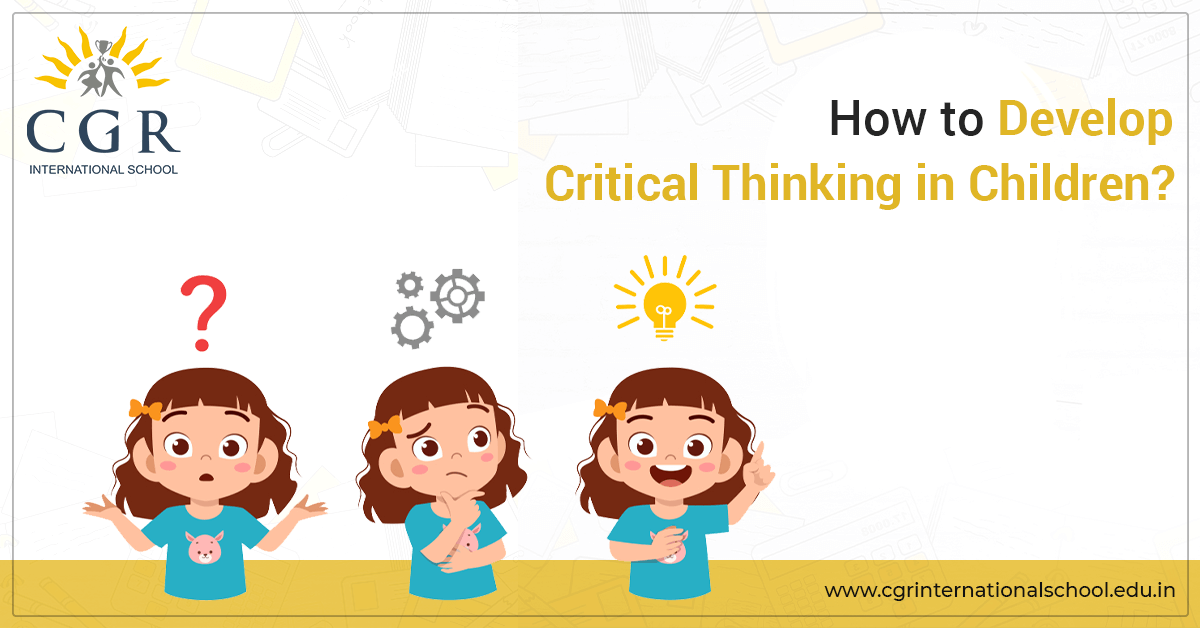How to Develop Critical Thinking in Children?


Build a strong foundation for critical thinking in early childhood.
“The function of education is to teach one to think intensively and to think critically. Intelligence plus character- that is the goal of true education.” – Martin Luther King, Jr.
Today, critical thinking has been the common topic debated from the perspective of a child’s holistic development. In this article, we will reflect more on the aspects of critical thinking in the context of child development.
Critical thinking in human development occurs from 5 to 9 years of age. This is the age where brain development is at its peak. Critical thinking can be explained as the ability to think rationally, understanding the logic behind the ideas and their connections. Many notable scholars and philosophers like Plato and Socrates had a discourse on critical thinking and the modern age still thinks about it.
We are familiar with phrases like ‘out of the box thinking’, ‘think beyond’, ‘think innovative’, ‘thinking cap/hat’, and so on. All these terms stress one thing that is ‘Thinking’. Thinking is a rational, logical and a sensible thought process in the mindset of every individual. Thinking patterns may vary for different people and are based on individual differences. It also varies from situation to situation.
With critical thinking, a child will be able to:
- Understand links between concepts (Innovative thinking)
- Think beyond what is taught (Deep thinking)
- Raise analytical questions (Reasoning)
- Thinking solutions to problems systematically (Analytical thinking)
- Rationalize and derive assumptions (own beliefs/judgment)
Tips to develop critical thinking:
- Develop critical thinking through Play: Games like building blocks and puzzles are ideal plays to motivate critical thinking in children. It allows them to come up with different ideas to build using blocks. They can build numerous things with it. They can create objects out of nothing. For puzzles, they might think differently to solve them.
- Give them room to think: While studying or any other interactions, take time to listen to your child. Encourage them to try different ways while attempting a task. Give more opportunities for your child to initiate, think and answer or do something. Don’t rush to solve for them or allow them to give up easily. It is absolutely fine to take time to think rather than blindly answer multiple-choice questions. In this way, the child will develop analytical thinking.
- Encourage reasoning by placing questions before them: By asking open-ended questions to children, you are allowing them to think on their own without any limits. Questions like – What do you think it is? Do you think it will work?, without judging their responses, you could ask them what the reason behind their thoughts is and so on. They will be motivated to produce evidence to support their answer. This helps to develop logical thinking.
Simple questions to help critical thinking:
5W’s and 1H – Who, What, When, Where, Why, and How. Ask these questions and see the difference. Apply them every day in your routine. Your Child is sure to make a difference.
As a parent, step ahead to nurture critical thinking in your child from an early age, make the best use of the opportunities in front of you, and create a bright future for your kids. Encourage wearing a thinking hat every day. Critical thinking requires persistence and practice.
The world has become more comprehensive and competitive bringing a lot of challenges and opportunities we never heard of a few decades ago. It’s the digital era and more complicated applications are evolving day by day. We need to prepare our children to cope with the current pace of advancement. If we lay a strong foundation now, thinking about the future will be a great help for the child.
What is awaiting our children? There are plenty of possibilities with the latest technologies. Learning and development will be progressing, and the outcome will be extraordinary. Great ideas have bloomed out of nothing. At CGR International School we make more space for children’s innovative imagination. Our teaching aids and motivational teaching expertise aims to highlight children’s positive development.
